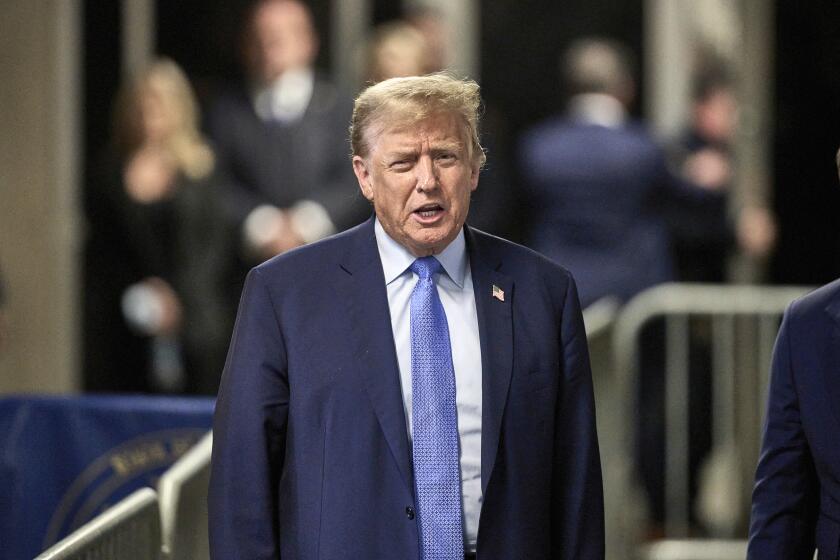Deficit committee heads for less-than-super endgame
Congressional leaders are negotiating an endgame for the “super committee” that could come as soon as Monday as Democrats and Republicans blame one another for what appears to be the panel’s failure to come up with a $1.5-trillion deficit reduction plan.
Despite a flurry of last-minute proposals and closed meetings, it appeared increasingly unlikely that members of the bipartisan committee could compromise on the contentious issues of taxes and entitlement spending that have deadlocked the talks.
As President Obama returned from a weeklong trip to Asia, the White House urged the committee to accomplish what it set out to do.
“Avoiding accountability and kicking the can down the road is how Washington got into this deficit problem in the first place,” White House spokeswoman Amy Brundage said. “So Congress needs to do its job here and make the kind of tough choices to live within its means that American families make every day.”
The co-leaders of the panel, Rep. Jeb Hensarling (R-Texas) and Sen. Patty Murray (D-Wash.), in separate appearances on Sunday talk shows, said they held out hope for last-minute progress but saw little chance of breaking the impasse.
“Reality is to some extent starting to overtake hope,” Hensarling said on “Fox News Sunday.” “It is a huge missed opportunity.”
The deadlock focuses on familiar economic themes that have divided Congress all year and will underscore the choice before voters in the 2012 elections.
Republicans blamed Democrats for being unwilling to seriously revamp Medicare and the other health programs to reduce government spending.
Democrats say Republicans refused to substantially break their anti-tax pledge, insisting on a deal that would preserve the George W. Bush-era tax breaks for the wealthy.
“There is one sticking divide, and that is the issue of what I call shared sacrifice, where everybody contributes in a very challenging time for our country,” Murray said on CNN’s “State of the Union.” “That line in the sand, we haven’t seen any Republicans willing to cross yet.”
The committee has until Wednesday to vote on a proposal that would reduce the nation’s deficits by $1.5 trillion over a decade. Talks continue behind closed doors, but with the requirement that any deal be posted by Monday evening, prospects for a compromise have dimmed.
In bringing negotiations to a close, leaders are seeking to salvage what remains of Congress’ already dismal approval ratings, according to those familiar with the private talks but who were not authorized to speak publicly.
Wall Street analysts have indicated that the committee’s inability to strike a deal would not seriously upend financial markets, even though retailers are concerned that it could hurt consumer confidence before Black Friday launches the holiday shopping season.
Economists are watching what comes next from Congress, which has a year-end workload that could be more difficult if the partisan divide deepens.
With those factors in mind, an announcement by the two leaders of the panel, coming before the Wednesday deadline, could reduce the spectacle of drawn-out partisan political theater. At one point, some had discussed bringing separate proposals for a vote only to see them fail along party lines.
“There’s no reason to burn the house down as you leave,” said one aide familiar with the talks.
Publicly, at least, there has been little progress since both sides balked at each other’s most recent proposals as House Speaker John A. Boehner (R-Ohio) and Senate Majority Leader Harry Reid (D-Nev.) stepped in to swap offers late last week.
Obama has largely stayed away from publicly intervening in the committee’s work. That has drawn criticism from Republicans, even though Democrats say they keep in constant contact with the White House.
If no deal is reached, domestic and Defense Department accounts will face automatic spending cuts that would be triggered in 2013. Defense hawks are angling to protect the Pentagon.
Sen. Patrick J. Toomey (R-Pa.) said on CBS’ “Face the Nation” that it was important to “change the configuration” of the mandatory cuts to soften the blow on the Pentagon in particular.
But Rep. Xavier Becerra (D-Los Angeles) said on Fox that it would be “wimpy” to undo the so-called triggers.
In the committee’s final days, the Republicans’ latest offer was a package that would cut $640 billion off deficits over a decade — far below the committee’s goal but a fallback proposal that could make a down payment on reining in federal deficits and limit mandatory reductions. It included $3 billion in new tax revenue that would come from closing the loophole that allows a tax deduction for corporate jets.
“Our Democratic friends said no to that offer because it didn’t raise taxes,” Sen. Jon Kyl (R-Ariz.) said on “Meet the Press.”
Democrats initially sought more than $1 trillion in new taxes as well as more than $1 trillion in spending cuts as part of a broader package, a level of revenue Republicans called a nonstarter. Their more recent offers sought less tax revenue.
“We didn’t come here to do another tax cut to the wealthiest people,” Sen. John F. Kerry (D-Mass.) said on “Meet the Press.”
Even if the committee fails this week, members say their work will continue. Already, some lawmakers are discussing where to pick up from the panel’s work.
More to Read
Get the L.A. Times Politics newsletter
Deeply reported insights into legislation, politics and policy from Sacramento, Washington and beyond. In your inbox three times per week.
You may occasionally receive promotional content from the Los Angeles Times.








